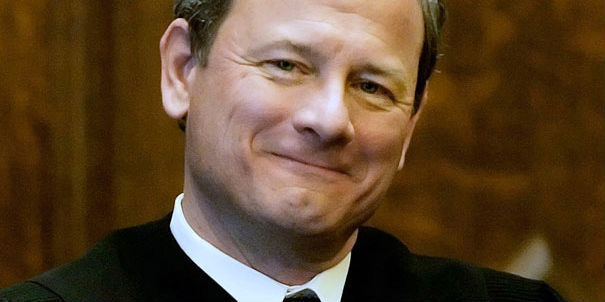Supreme Court Chief Justice John Roberts
Videos by Rare
Two summers ago, the Supreme Court—or more precisely, Chief Justice John Roberts—saved Obamacare.
But it may soon get another chance to deal the health care law a fatal blow.
In Halbig v. Burwell, a federal appeals court ruled on Tuesday that the Affordable Care Act as written does not permit federal subsidies to people living in states that have not set up their own Obamacare exchanges.
The ruling states “the ACA unambiguously restricts the section 36B subsidy to insurance purchased on Exchanges ‘established by the State.” People who live in states that opted not to create their own Obamacare marketplaces and buy their insurance through the federal exchange would therefore be ineligible for subsidies.
For the time being, nothing will change. The Obama administration has indicated it will continue paying out the subsidies. On the very same day, another more liberal circuit appeals court reached the opposite conclusion and ruled in favor of Obamacare subsidies for the federal exchange. So there’s no guarantee the Halbig ruling will stand.
Liberals are nevertheless outraged by the decision, alternating between claiming the language was about state exchanges was some kind of a mistake (it wasn’t) and blasting Halbig as right-wing judicial activism.
“When a court is faithful to the text of a law that Congress passes and government enacts, we do not have an activist court, we have a court doing its job,” David Harsanyi sagely observes. “An activist court might be one that divines intent or retroactively assigns it, as the Roberts court did with the Individual Mandate.”
Yet the liberal freak-out isn’t entirely unwarranted. The practical effect of this ruling would be to gravely, perhaps mortally, damage Obamacare. The Obama administration and its congressional supporters assumed that only a few states would fail to create exchanges, probably (in their view) conservative backwaters. They even entertained denying subsidies to these holdouts themselves.
In fact, only 16 states set up their own exchanges. (Massachusetts actually destroyed their Romneycare exchange to comply with Obamacare.) According to at least one estimate, the 5 million Americans who bought subsidized health insurance through HealthCare.gov would see their premiums rise by an average of 76 percent.
In several reddish states (including a few with Senate races this fall), the average premium increase could range from 80 to 95 percent. An argument could be made that this is less a premium increase than a shifting of the burden from taxpayers to Obamacare enrollees. Either way, it makes the federal healthcare law as currently written unsustainable.
Roberts was unwilling to rule Obamacare unconstitutional, though it plainly was. It is therefore far from certain that he would be willing to eviscerate the law by other means. The battle cries against a partisan, activist, ideological Supreme Court he avoided in 2012 would once again fill the air. The only way the judges can avoid this condemnation is if they save the Democrats from their own badly written law.
No less a liberal legal scholar than Laurence Tribe, Obama’s professor at Harvard Law School, sees a major problem with the existing Obamacare language, however. “I don’t have a crystal ball,” Tribe told the Fiscal Times. “But I wouldn’t bet the family farm on this coming out in a way that preserves Obamacare.”
The family farm may have to be sold to pay for the new, much higher Obamacare premiums. Without subsidies for the federal exchange, the law will fail and have to be rewritten—maybe with a Republican-controlled House and Senate.
Obamacare survived Bart Stupak’s short-lived pro-life Democrat rebellion. It has endured multiple attempts to repeal or defund the law in whole or in part. It made it through the 2012 election. It may not cheat death again.
There is a limit to how happy conservatives should be about this scenario, however. Yes, Obamacare will become unworkable and there will be an opportunity for another crack at reform. But in addition to the real hardships that will be faced by many lured into Obamacare by their government, conservatives will be faced with a problem.
Most genuine free-market health care reform plans require a robust individual insurance market. A death spiral could have severe consequences for existing insurance markets, making something better than Obamacare or the pre-Obamacare status quo difficult to implement or enact.
With millions of people who have bought health insurance from HealthCare.gov facing higher premiums and blaming Republican-appointed judges, the pre-Obamacare status quo will not be an option.
There’s a good chance John Roberts will get another bite at the Obamacare apple. We’d all be better off if he did his job the first time.



